The biggest entertainment stories
Get our big stories about Hollywood, film, television, music, arts, culture and more right in your inbox as soon as they publish.
You may occasionally receive promotional content from the Los Angeles Times.
As podcasting culture continues to evolve, we track its evolution in Audiosphere, an occasional series on the people who are making some of the genre’s most fascinating shows.
BY MARGY ROCHLIN
April 9, 2020
Steve Schirripa and Michael Imperioli — also known, respectively, as the sweet-natured foot soldier turned capo Bobby “Baccalà” Baccalieri and Tony Soprano’s swaggering hothead protégé Christopher Moltisanti on “The Sopranos” — dropped a TV rewatch podcast called “Talking Sopranos” on Monday. Their plan is to revisit all 86 episodes of the landmark HBO crime series. Sometimes they will have guests; sometimes it will just be the two men shooting the breeze in their rasping wiseguy voices.
If it lives up to its potential, “Talking Sopranos” could be a godsend in these difficult times: a chance for everyone sheltering in place to escape inside an episode, to recall the glory that is this iconic, beautifully made crime drama in all its emotional and physical violence and eccentric hilarity, guided by two insiders breaking down the action and swapping memories. ...
Schirripa also admits to having never listened to a podcast. But it doesn’t matter: Both he and Imperioli are natural storytellers. Right now, the podcast is a bit shaggy. In the first installment, Imperioli kicks things off by admitting they’re both depressed and they don’t begin rewatching the hour-long pilot until 34 minutes into the podcast. But when they click, the tales are singular. On what other podcast can you hear that actor Tony Sirico, who played the preening thug Paulie Walnuts, was once a nightclub bouncer and claimed to regularly give wedgies to Jimi Hendrix? ... CONTINUE READING
BY SAMMY ROTH
November 26, 2019
Hey, Sammy, this is Tom Friendly.”
That’s how the actor M.C. Gainey introduced himself when he surprised me with a phone call while I mingled with other environmental journalists at a conference in Pittsburgh. I was dumbfounded until I remembered I had emailed his agent that morning asking for an interview.
Gainey sounded exactly like his TV character on “Lost,” with the same gruff, quietly menacing voice that told plane crash survivor Michael, father of 10-year-old Walt, “We‘re gonna have to take the boy.”
And now I could ask him all about that scene. I was stoked.
When “Lost” ended its six-year run on ABC nearly a decade ago, I was a 17-year-old high school senior who watched each episode religiously and looked forward to sharing theories with my friends the next morning. I never dreamed the show would be a bigger part of my life now than it was then.
And yet here I am, co-hosting “The Hatch: A Lost Podcast.” Every week, I rewatch an episode of “Lost” and analyze it with my friend and fellow journalist Rosalie Murphy, editor-in-chief of Akron magazine the Devil Strip. Every week, we share an interview with a member of the cast or crew, or sometimes an academic who has written about the show. ...
For huge “Lost” fans like me and Rosie, we’re basically living the dream. . . . CONTINUE READING
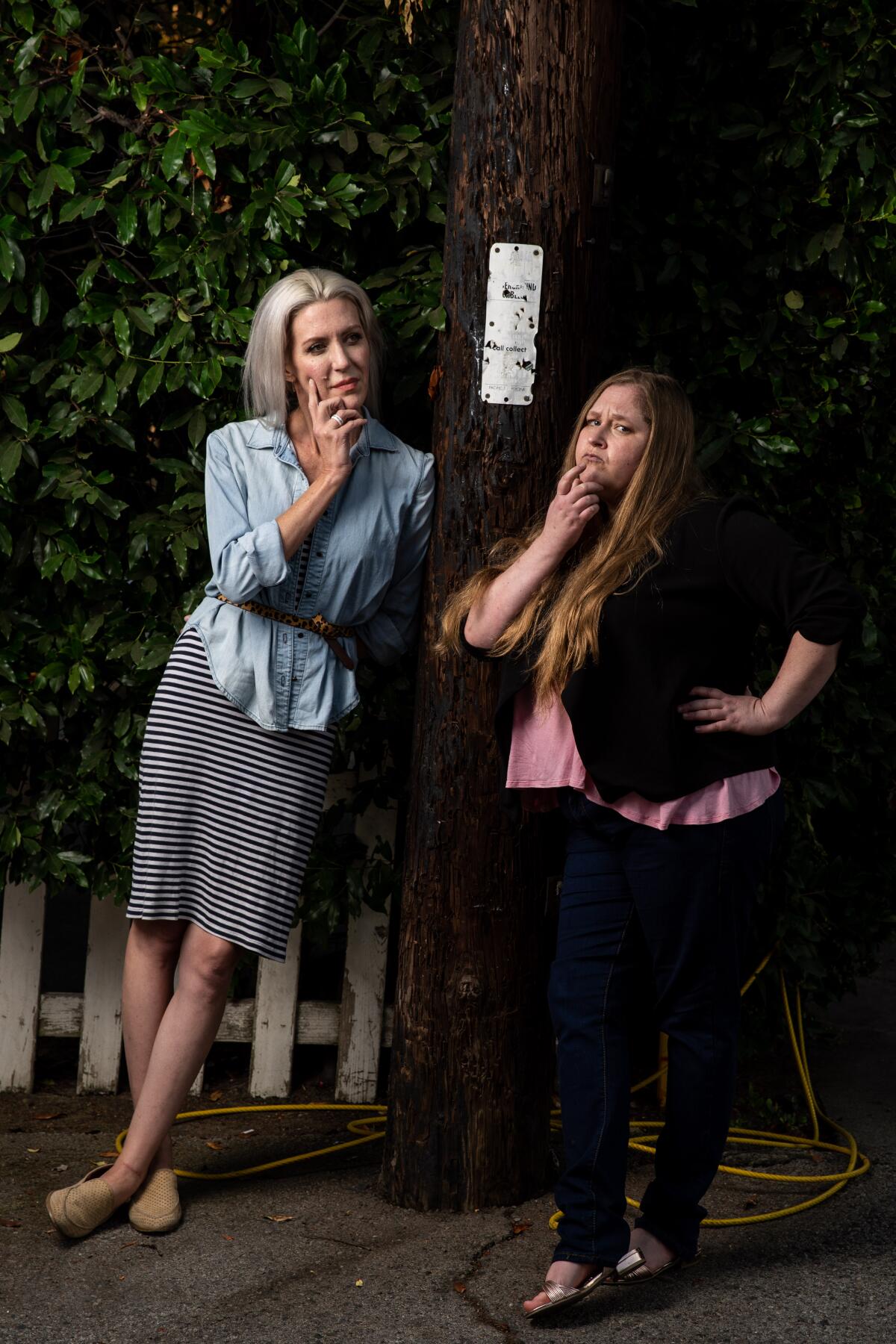
BY MARGY ROCHLIN
November 6, 2019
Back in 2017, Susan Nalle, a senior associate director and coordinating producer at NBC’s true crime newsmagazine “Dateline,” was home on a Saturday night when she noticed a tweet from the co-hosts of a new podcast called “A Date With Dateline.” Only two episodes had been posted, but she gave the show a listen. “Frequently when people have our name in [their tweets] we follow them or at least pay enough attention to see if they’re a good friend or a bad friend,” Nalle says. “They were definitely a good friend.”
On the podcast, co-hosts Kimberly Arnold and Katie Mitchell spend an hour or so walking their listeners through an episode of “Dateline” while offering exceedingly granular observations, and occasionally referencing other TV shows like TLC’s long-distance relationship reality series “90 Day Fiancé.” Nalle, who heads up “Dateline’s” social media team in addition to many other duties (some call her “the final eyes on the show”), immediately sent a direct message requesting Arnold and Mitchell’s home addresses: She wanted to welcome them into the family with series-branded socks and tote bags.
A year later, when Nalle found out that Arnold and Mitchell were attending the 2018 CrimeCon in Nashville, she made sure they were invited to a special “Dateline” screening. When they arrived at the event, the two women were surprised to learn that their podcast had attracted a few other gold-star supporters from the show, including Josh Mankiewicz, one of the newsmagazine’s hard-boiled correspondents. “Hi, we’re the girls from ‘A Date With Dateline,’” is how they introduced themselves to Mankiewicz. His response? “Why haven’t I been on your show yet?” . . . CONTINUE READING
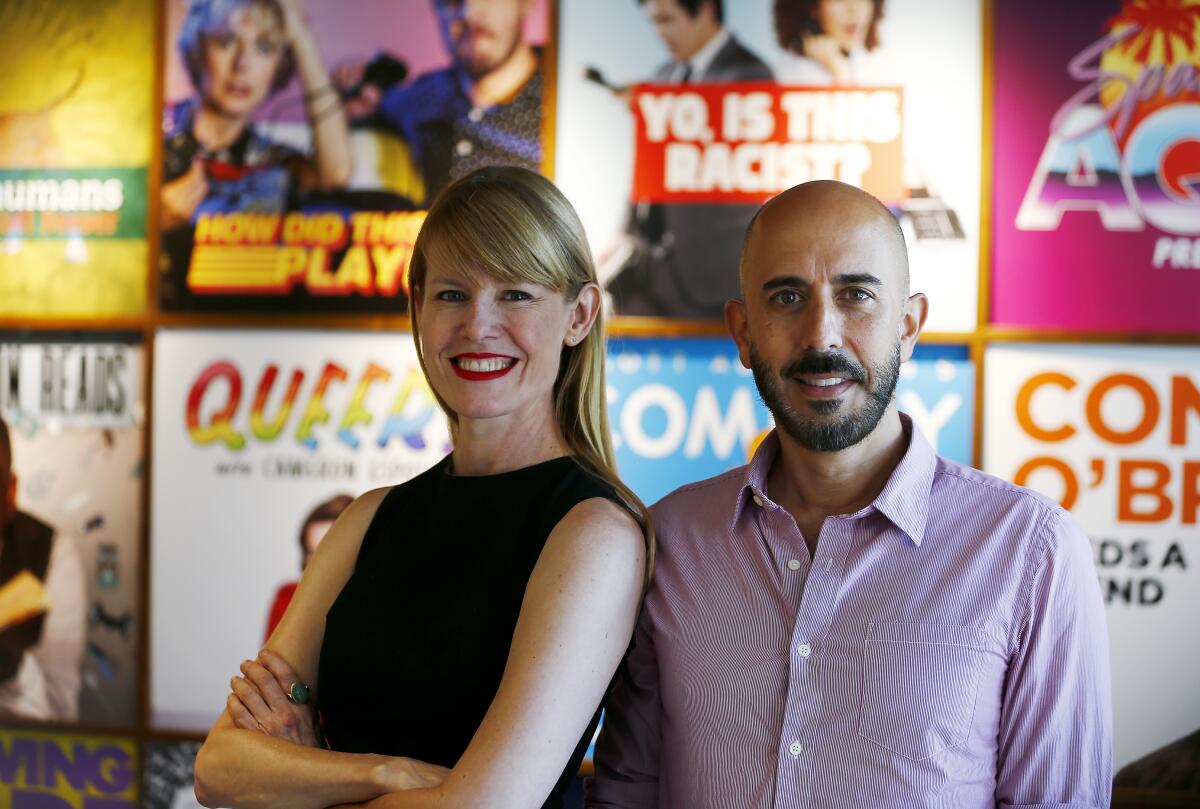
BY MARGY ROCHLIN
September 16, 2019
In every long friendship, there’s a tipping point, the moment where passing acquaintance blossoms into something like platonic love. Jessica Bendinger and Michael Seligman’s tipping point arrived in 2004 when Bendinger asked Seligman for advice about fixing up her house.
“In addition to Michael’s other skills, he’s a talented interior designer,” says Bendinger, sitting in a cramped recording booth at the Hollywood offices of the podcast network Stitcher. “He saw my stuff, he saw my problems. He could see I needed help…”
“…And I was like, ‘Oh, girl, I love you,” Seligman says, jumping into the story. “Let’s give you some of that sissy magic.’”
This led to a barter arrangement: “I was like, ‘Listen, I’ll trade you. I’ll give you notes on your screenplay if you help me with my house,’” says Bendinger, who wrote the iconic cheerleader comedy “Bring It On.”
These days, the pair’s sentence-finishing interplay is used to full effect in “Mob Queens,” a 12-episode podcast in which they explore the little-known story of Anna Genovese, a mob wife who was a pivotal figure in lower Manhattan’s drag bar scene —and who broke the biggest rule of the Cosa Nostra when she showed up at a public hearing in 1953 and spilled the dirty dealings of her soon-to-be ex-husband, mafia kingpin Vito Genovese. . . . CONTINUE READING

BY WENDY LEE
September 9, 2019
When Dawn Ostroff began working the graveyard shift at a Miami radio station, her parents assumed her career in radio would be short-lived. The college student was awkward reading the news, but she honed her skills and kept her job. Four decades later, Ostroff is transforming the next generation of radio for the world’s largest music-streaming subscription company.
Since she was tapped as Spotify’s chief content officer about a year ago, Ostroff has been charged with building an arsenal of podcasts to catapult the Swedish business to become a leader not just in music but also audio storytelling. Under her watch, the number of podcasts available on Spotify has grown to more than 450,000 titles, up from 185,000 in February.
The company, with offices in New York and L.A., has earmarked up to $500 million this year to buy podcast-related businesses, and already Ostroff has snapped up podcast studios including New York-based Gimlet Media and L.A.-based Parcast to create exclusive content for Spotify. Next year, Ostroff says the plan is to have “hundreds and hundreds” of new original podcast series in production or available on the platform.
“Becoming the most listened to audio network means that we needed to expand from just being a music platform to incorporating other types of audio, entertainment and information on the platform,” Ostroff said in an interview from Sweden. . . . CONTINUE READING
BY AUGUST BROWN
July 19, 2019
The hosts of “Last Podcast on the Left” do not feel especially vindicated that they were right about an alleged pedophile conspiracy that has ensnared top government and media figures.
“It’s sad that so many conspiracy theories have become true, but it’s good that the rocks are being overturned and we’re seeing all the bugs,” said co-host Ben Kissel.
“No one knows where Jeffrey Epstein’s money comes from, and the president has no interest in seeing him going down,” co-host Henry Zebrowski added.
For close to a decade, Kissel, Zebrowski and Marcus Parks, all in their mid-30s, have covered conspiracy-theory culture on their show, a pioneer of true-crime and horror-comedy podcasting. Subjects have run the gamut from the very plausible (intelligence failures around 9/11) to gleefully nutty (the moon is secretly hollow) to the sad and sordid (Jeffrey Epstein and the history of pedophiles in government). With Epstein and R. Kelly now looking at serious prison time for allegedly running organized sex cults, and with a president who embraces (and stars in) far-reaching conspiracy theories, the fringe culture the podcast has documented for years is more salient than ever. . . . CONTINUE READING
BY MATT BRENNAN
June 19, 2019
“Chernobyl” isn’t the likeliest of hits. The five-part HBO/Sky Atlantic co-production, which concluded earlier this month, offers a detailed examination of the causes and consequences of the April 1986 explosion at the nuclear power plant in northern Ukraine — including sustained attention to the intricacies of Soviet bureaucracy, the nature of fission and the gruesome results of radiation poisoning. It lacks the bombast of “Game of Thrones,” the star power of “Big Little Lies,” the lacerating humor of “Veep.”
And yet “Chernobyl,” written by Craig Mazin and directed by Johan Renck, has attracted more than 9 million cumulative viewers to date, according to HBO — plus 6.5 million downloads or views for the five episodes and trailer of its companion piece, “The Chernobyl Podcast,” in which Mazin and co-host Peter Sagal separate fact from fiction in the series’ version of events. (That number includes 2.3 million downloads or views since June 5; the series finale aired June 3.)
“When we talk about broad audiences, we’re usually talking about art that has a fairly wide target — generally speaking, everybody can agree that this sort of thing might be exciting or fun or sad,” Mazin says in a telephone interview. “[‘Chernobyl’] is not a broad audience kind of show, at least in my mind, but it turns out that there’s a much wider interest in this kind of storytelling than everybody expected.”
“The Chernobyl Podcast” taps into this organic fascination in part because it doesn’t come across as a form of marketing: Mazin, whose “Scriptnotes” podcast with co-host John August launched in the summer of 2011, wanted to make a companion piece from the outset. . . . CONTINUE READING
BY KATE TUTTLE
June 7, 2019
The room was filled with rare books, black balloons and Murderinos.
The die-hard fans of “My Favorite Murder,” a true-crime comedy podcast, recently gathered at the Strand bookstore’s Rare Books Room to celebrate the publication of “Stay Sexy & Don’t Get Murdered,” a combination memoir and advice volume written by the popular podcast’s hosts, Georgia Hardstark and Karen Kilgariff. Hardstark, in a vintage-inspired blue dress, and Kilgariff, sleek in black to match her hair, thanked the crowd of around 100 in the classic New York venue.
“We had so many people who were looking out for us, and who believed in us,” Hardstark said.
“We really lucked out,” Kilgariff agreed, singling out the team at Forge, their publishers. “When I tell you we were hand-held through this process, we were held like little tiny babies.”
A longtime fan of the podcast, editor Ali Fisher reached out to Kilgariff and Hardstark in 2016 to talk about the possibility of writing a book. . . . CONTINUE READING
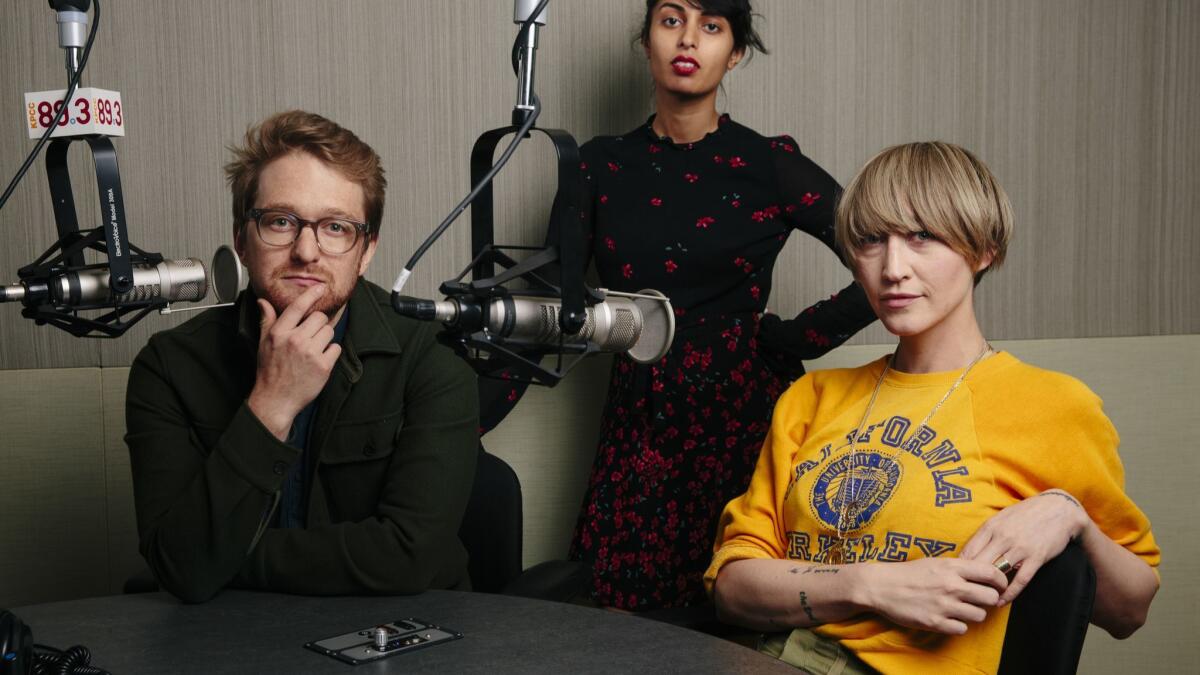
BY NATE ROGERS
March 29, 2019
For those who went through it, the 1994 Northridge earthquake was plenty big enough. Fifty-seven were killed, 8,700 were injured, and the damage was in the tens of billions. Freeways collapsed. The scoreboard of Angel Stadium fell onto (unoccupied) seats. The shaking reverberated throughout the Greater L.A. area in the middle of the night, and it was terrifying. But it wasn’t a Big One.
That designation refers to a quake measuring 7.8 or larger in magnitude (Northridge was a 6.7), which tends to happen — or come close to happening — in the southern section of the San Andreas fault approximately every 100 years. There hasn’t been one there since 1857.
“The last time one struck, there was no Union Station, no Hollywood, no freeways to destroy or skyscrapers to crumble, no fifth-largest economy in the world to cripple,” Jacob Margolis warns gently in the KPCC podcast “The Big One: Your Survival Guide.”
“We don’t know when the Big One’s gonna hit,” Margolis says. “It could be in a year, it could be a week, or literally any minute now. But we do know that when it does, you’ll have an overwhelming feeling that Mother Nature doesn’t care. That you’re small.” . . . CONTINUE READING
BY JODY ROSEN
March 22, 2019
Less than a minute into the first episode of “Conviction,” the latest release from the Gimlet Media podcast network, the narration takes on a hardboiled tone.
“Manny Gomez, private eye, lives alone in a small apartment in a quiet part of the Bronx,” says Saki Knafo, the show’s host and writer. “He’s got this watch that’s really a camera, and he has a pen that’s really a knife. He says his favorite book is the Bible, but the one he talks about most often is ‘The Art of War.’ ”
Those sentences carry echoes of classic pulp detective fiction, whose tough-talking gumshoes were also the stars of old-time radio serials, the “podcasts” of an earlier age.
It’s a nervy move to begin a nonfiction tale of crime, cops and municipal corruption with a big sidelong wink at Raymond Chandler. But Knafo knows what he’s doing. That Chandleresque introduction, like nearly all the writing in the seven-part series, is fine and sharp and gives off a gleam; it’s Knafo’s pen that’s the knife. He is invoking the hardboiled tradition ironically, setting us up for a real-life detective story that leaches out all traces of glamour — a darker shade of noir than any Philip Marlowe mystery.
Knafo is also laying thematic groundwork. Figuratively speaking, “Conviction” is all about watches that are really cameras and pens that are really knives: about the distance between what things appear to be and what they really are, about the moral fog that clouds distinctions between justice and vengeance, good guys and bad guys, truth and lies. . . . CONTINUE READING
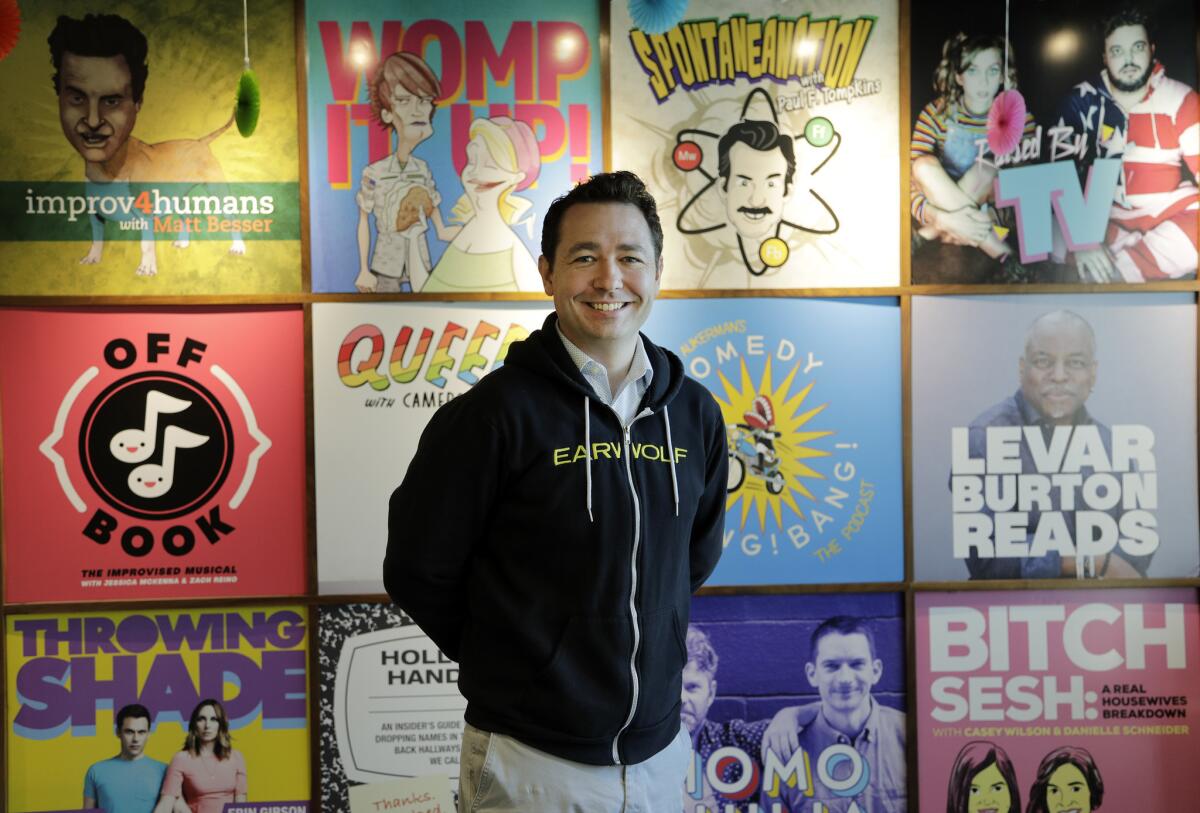
BY ANDY HERMANN
Dec. 29, 2018
When Scott Aukerman and Jeff Ullrich came up with the idea of launching a podcasting network in 2010, it was a tough sell. Their connections in the worlds of television and stand-up comedy barely knew what podcasts were, let alone understood the appeal of bundling a whole bunch of them together.
“We would get laughed out the door,” Aukerman says of some of their early meetings at talent agencies like CAA. “People really didn’t get it at the time.”
Eight years later, their network, Earwolf, is one of the most successful producers of comedy podcasts in the business, with 35 shows that are collectively downloaded over 14 million times a month. Anchored by Aukerman’s own long-running “Comedy Bang! Bang!”, Earwolf is now the podcasting home of an enviable roster of talent that includes Paul F. Tompkins, Michael Ian Black, Cameron Esposito, W. Kamau Bell, Hari Kondabolu and Gilbert Gottfried.
Recently, Earwolf raised its profile even further by welcoming Conan O’Brien into the fold. His long-form interview show, “Conan O’Brien Needs a Friend,” is “our biggest show already,” according to the network’s executive producer, Colin Anderson. . . . CONTINUE READING
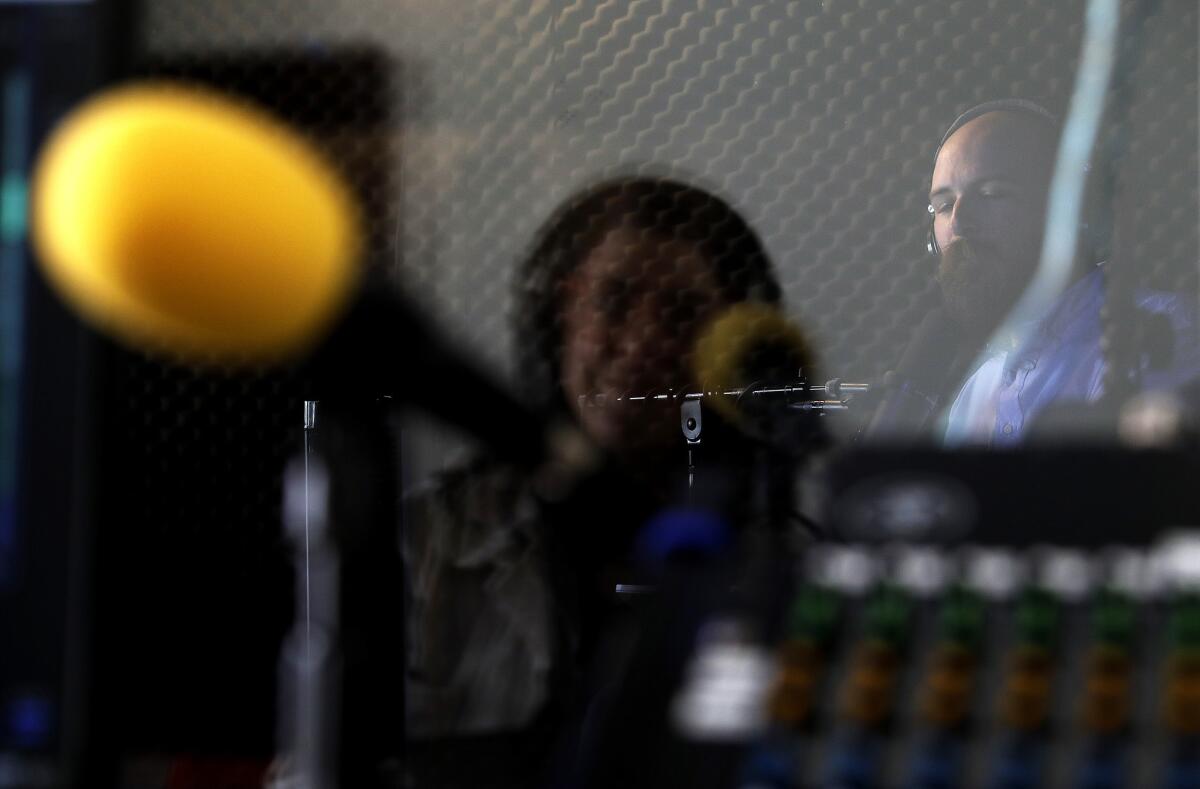
BY HAYLEY FOX
November 7, 2018
Overlooking MacArthur Park Lake, Jesse Thorn is recording tracks for his latest “Bullseye” podcast episode inside a recording booth that he bought off Craigslist for $3,500. The approximately hour-long interview show, which also airs on NPR, features intimate conversations with musicians, artists, comedians, celebrities and creators of all kinds.
On this particular day, Thorn is powering through some guest intros, advertisement reads and his signature closing, “The Outshot,” where he recommends a song, painting or other piece of culture to the audience. Aside from the occasional pause to share a joke with producer Kevin Ferguson — or the even rarer need to re-record a track because of a stumble or throat gargle — it’s clear Thorn has done this more than a few hundred (or perhaps few thousand) times.
“I’m trying to demonstrate that I’m a one-take wonder, Kevin,” Thorn says jokingly, from inside the booth.
But he is a “one-take wonder.” . . . CONTINUE READING
BY HAYLEY FOX
October 2, 2018
For more than a year, Laura Krantz searched for Sasquatches and the people who love them. She tromped through the Pacific Northwest looking for Bigfoot nests, frequented Sasquatch-enthusiast chat rooms, and talked to scientists about how DNA testing may be able to be used to help prove — or at least explain — the hairy fella’s existence.
Krantz’s podcast, “Wild Thing,” a nine-part series whose first episode launches today, combines on-the-forest-floor reporting with eyewitness accounts and expert testimony on the theories behind the famous, hairy biped. But “Wild Thing” isn’t just the story of her search for one of the world’s favorite mysterious creatures, it’s a look into something just as surprising: her family history. Krantz is Bigfoot royalty. . . . CONTINUE READING
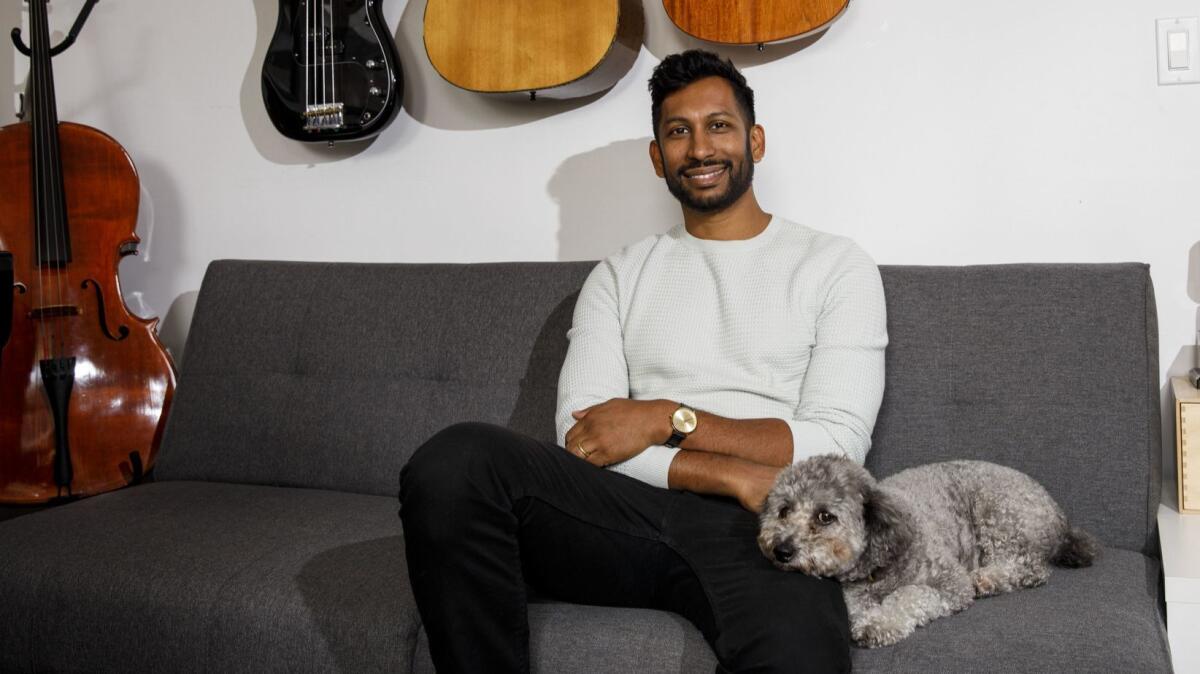
BY ANDY HERMANN
September 25, 2018
Years before he got into podcasting, Hrishikesh Hirway heard a strange sound on his street late at night.
It was a passing truck, dragging glass bottles behind it that clinked against the pavement. He grabbed a recorder and ran outside to capture the sound, then looped it to create a “little texture” in a song by his synth-pop project, the One AM Radio.
“No one is ever gonna know that happened, but that’s such a strong memory for me,” he says now, sitting in the home studio in Eagle Rock where he creates his biweekly music podcast, “Song Exploder.” “It’s an important part of the song’s DNA. And I thought about how so many songs have those kinds of secrets in them.”
On “Song Exploder,” Hirway and his guests — who have included the likes of “Royals” pop singer Lorde, “Game of Thrones” composer Ramin Djawadi, hip-hop group the Roots and indie rock pioneers R.E.M. — excavate those secrets, using a tune’s isolated tracks, or “stems,” to explore the songwriting and recording process. With the musicians themselves serving as narrators, listeners get to hear songs stripped to their component parts and learn how — and why — those parts were created. . . . CONTINUE READING
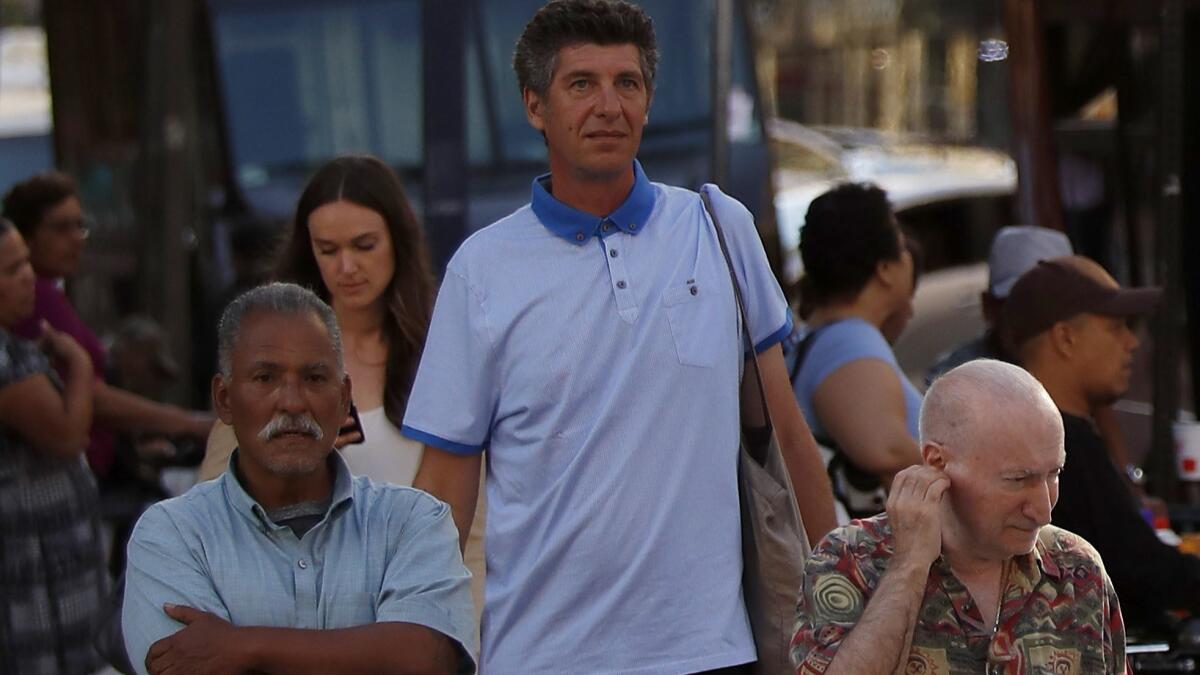
BY HAYLEY FOX
September 4, 2018
As the crowd clutched their iced coffees and settled into the homey hodge-podge of chairs and benches on the back patio of Stories bookstore in Echo Park, Scott Schultz took the small stage on a recent evening.
He introduced himself with a brief a capella version ZZ Top’s “Waitin’ for the Bus,” then he asked the crowd a question: “How many of you consider yourself a green commuter?” A small tide of claps, “woos” and other noise emerged from the crowd.
Part showman, part stand-up comedian — and a little bit Huell Howser — Schultz is the one-man-machine behind BUSted, a showcase of storytellers recounting tales from the front lines of L.A.’s buses, trains and sidewalks. It’s like acclaimed storytelling series “The Moth,” but where the theme is always public transit (in fact, as Schultz points out, many of his regular speakers are Moth champions). BUSted’s monthly live event at Stories — and third Wednesdays of each month in Pasadena’s Battery Book — has expanded to include a YouTube channel, podcast, web series and slew of other live events, but the narrative extravaganza consistently features a diverse cast of characters.
The one thing they always have in common is deep pride in being a “non-motorist,” says Schultz. . . . CONTINUE READING
The biggest entertainment stories
Get our big stories about Hollywood, film, television, music, arts, culture and more right in your inbox as soon as they publish.
You may occasionally receive promotional content from the Los Angeles Times.